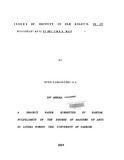| dc.description.abstract | This study investigates issues of identity of the Maasai community as reflected in Ole Kulet's works. This is by focusing on his first two novels: Is It Possible? and To Become a Man with a view to establish the extent to which the encroachment of Western values has caused a shift in Maasai identity
The study has used library research as its methodology. Moreover, It has been enriched by some information collected from Ole Kulet. The postcolonial theoretical framework guides the study These approach foregrounds the aftermath of the interaction between the indigenous cultures and a Western lifestyle in Colonialism. The interaction is ensued by a synthesis of the cultures and its products have a hybrid identity, which is enshrouded by ambivalences.
The work primarily analyses how the foreign formal education influences the Maasai identity. The Maasai pupils who acquire the Western education suffer from a loss of their Maasai cultural identity. The study also demoristrates the difficulties of achieving the status of a man. This is because the traditional parameters of defining Maasai manhood are no longer viable in a modern social set up.
Finally, the conclusion reveals that the intrusion of a Western culture on the indigenous Maasai culture leads to a shift in their identity. Furthermore, the Western values emerge as agents of emasculating the Maasai man. | en |

